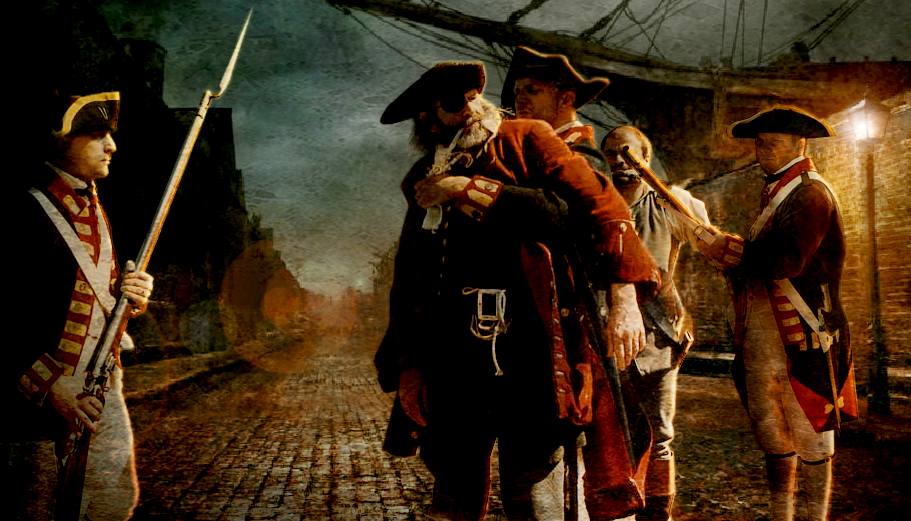

These setbacks are alleged to have angered the crew, who tried to coax Kidd into attacking ships over which he had no Royal protection. Many of his crew died of cholera on a small archipelago off the East coast of Africa. Despite his best efforts in the Indian Ocean and the Red Sea, Kidd failed to find any pirates. With his newly-acquired crew of hardened criminals with highly dubious credentials, Kid set sail for South Africa in a French ship he had captured on his travels to New York. Undeterred by his unexpected decline in men, Kidd sailed for New York, where he picked up a new crew – a real motley bunch if ever there was one. This act would soon come back to haunt him in ways he could not have imagined. In another later altercation, Kidd agreed that some “thirty or so men” would be surrendered to the Navy, but, as soon as he could, he set sail, saving those of his crew who had not been forced off the ship. It seems that Kidd and his men did not show respect to the Navy yacht at Greenwich and instead, slapped their backsides at them when a warning shot was fired over their hull for their disregard of naval custom. With his finest men prepared, Kidd almost managed to get the ship into open waters until an incident involving a Navy vessel saw many of the men pressganged off the ship and forced into naval service. His papers, signed by King William III laid out the terms and conditions of his privateering, guaranteeing no legal ramifications (provided he stay within the terms of the King’s wishes). His skills as a privateer were highly thought of, and he had access to financial backers in the form of English aristocracy. It wasn’t much of a leap in thinking for people to assume Kidd may have worked with his new bride to kill her husband, but despite this, they still maintained their circle of influence.Ī few years after this, in 1695, he was tasked with hunting the seas with the intent of attacking anyone who associated with pirates, as well as any French ships (whom we were at war with at the time). With her reputation as somewhat of a black widow, you would have thought Kidd may have thought twice about marrying her, but that wasn’t that case.

#Captain kidd death license
The fact that they applied for a marriage license merely 2 days after the death of her most recent husband sent the rumour mills into overdrive. Although she was only in her early twenties, Sarah had already been widowed twice, and was one of the wealthiest women in New York at the time, mainly due to an inheritance from her dead husband. It was whilst in New York at the age of 46 that he happened to cross paths with a young English woman called Sarah. In doing so, the privateers were allowed to keep whatever items, artefacts and jewels they found upon boarding. They were given special dispensation by their governments to attack enemy ships, without fear of reprisal. Kidd’s new life as a privateer served him very well, and he found himself in a world of influential and very powerful people. Under new rule, the ship was renamed Blessed William and became part of a small fleet of ships tasked with defending the British colony of Nevis from French attacks. Kidd eventually became captain as the result of a mutiny aboard the ship on which he was sailing, which saw him rise to the position over his peers. As an apprentice aboard a pirate’s ship, he quickly found his feet, gaining valuable skills that would serve him well in years to come. It should be of no surprise that William found himself following in his father’s footsteps, turning to a life at sea. What is known is that his father, Captain John Kyd, was lost at sea and his family were supported by a local society (perhaps a religious society?) in the years following the disappearance. William would have only been 6 years old at the time the town was laid to waste by English forces. It is not known whether or not Kidd and his family remained in Dundee after Kidd’s birth, but if they did, then they would have undoubtedly bore witness to the siege of General Monck in 1651. William Kidd was born in January of 1645, as identified by Dr David Robson, who found records of his baptism naming his birthplace as Dundee. Our tale lands us near the end of this era, with the rise and fall of a man from Dundee called William Kidd. Although piracy has been around almost as long as the act of sailing itself, the ‘Golden Age’ of piracy was between the 15th and 18th centuries.


 0 kommentar(er)
0 kommentar(er)
